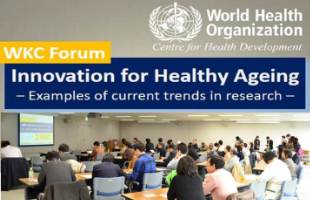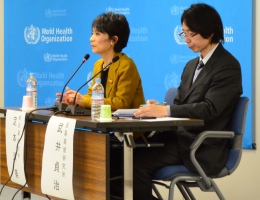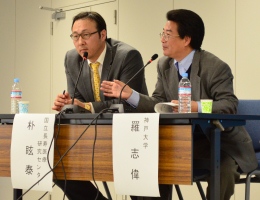WKC Forum report: Innovation for Healthy Ageing – Examples of current trends in research –

WHO Centre for Health Development (WHO Kobe Centre - WKC) held the first WKC Forum of the 2014 calendar year on one of its core programmatic themes: Innovations for Healthy Ageing. More than 70 participants were in attendance to learn about the latest research in three key areas of Japanese innovation for ageing populations, including academics and students, researchers, health practitioners, local government, industry, media, and private citizens of Hyogo prefecture. This WKC Forum followed the Global Forum on Innovations for Ageing Populations, held in Kobe in December 2013, and presented the opportunity to dive deeper into discussion on innovations in pharmaceuticals, robotics and e-health, and falls prevention.

Professor Zhi-wei Luo of Kobe University presented examples of some of the leading innovations in robotics that he and his colleagues have engineered for the health and independence of older adults. As individuals continue to live longer, ageing has begun to transform societies in profound ways. This includes relatively diminishing human and financial resources to support us as we age. The advances in robotics presented by Professor Luo have shown that these technologies can help to mitigate this problem. Professor Luo and his team developed human-like robotic nurses, capable of sensing and processing information about the patient as well as the strength and care needed to help a disabled older adult to sit up or move. They also developed machines that can adapt to human capability for training or for support. Robotics include robotic systems as well, including sensors that can feed back information about a patient’s health and mobility, and predict falls or other health events. Robotic systems also offer virtual reality environments that can both test and stimulate brain function.

Dr Teiji Takei, Director at the National Institute of Biomedical Innovation, led a lively panel discussion with the speakers, motivated by questions from the participants. The discussion primarily covered four main topics, including improving research design, increasing collaboration between innovators across sectors, applications of science and technology for health, and how the WHO can support innovation and ageing. However, collaboration was at the core of the discussion, even as the Forum concluded and the conversation moved into the hallways. The conversation moved from knowledge sharing, to problem solving, to partnership, and large agreement that these conversations, even across sectors, need to continue.

Presentations (Japanese)
- “Accessible innovations on pharmacological treatment and health management for older people”
Professor Kiyomi Sadamoto, Department of Clinical Pharmacy
Yokohama College of Pharmacy
- “Health engineering for aging using robotics”
Professor Zhiwei Luo, Department of Computational Science
Graduate School of System Informatics, Kobe University
- “Steps to ageing well – Home and community-based technologies for older adults”
Dr Hyuntae Park, Chief Investigator, Section of Motor Function Activation
Center for Gerontology and Social Science, National Center for Geriatrics and Gerontology

